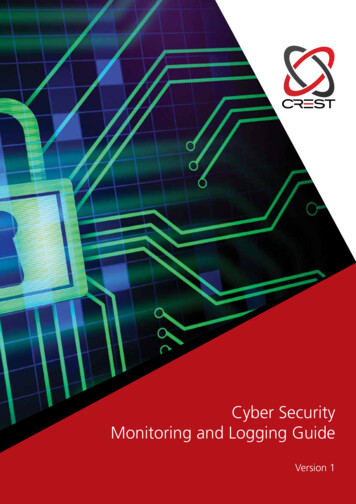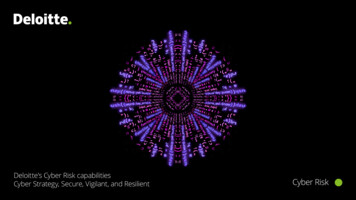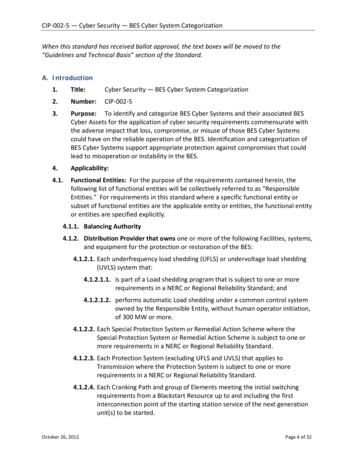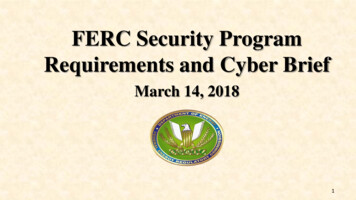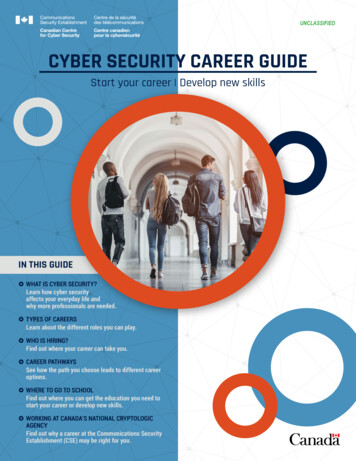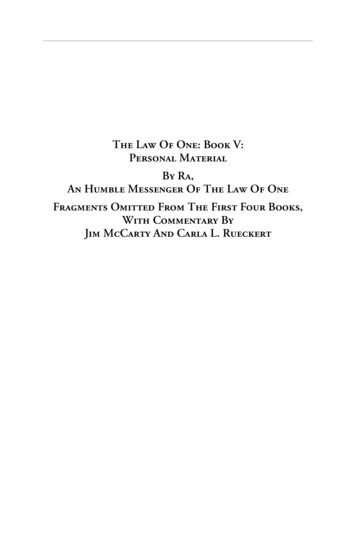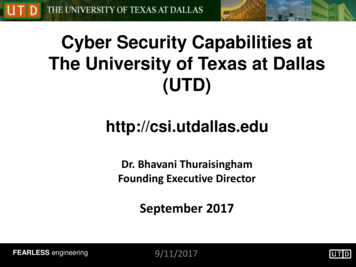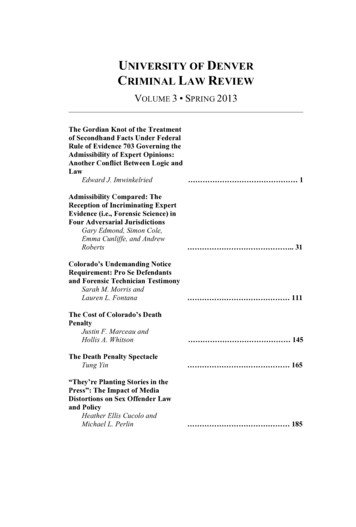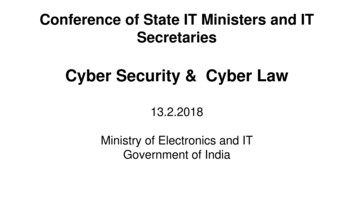
Transcription
Conference of State IT Ministers and ITSecretariesCyber Security & Cyber Law13.2.2018Ministry of Electronics and ITGovernment of India
National Cyber Security PolicyFramed by MeitY in 2013VisionTo build a secure and resilient cyberspace for citizens, businessesand Government.MissionTo protect information and information infrastructure in cyberspace,build capabilities to prevent and respond to cyber threats, reducevulnerabilities and minimize damage from cyber incidents through acombination of institutional structures, people, processes, technologyand cooperation.
National Cyber Security Policy ii.xiv.Creating a secure cyber ecosystemCreating an assurance frameworkEncouraging Open StandardsStrengthening the Regulatory frameworkCreating mechanisms for security threat early warning, vulnerabilitymanagement and response to security threatsSecuring E-Governance servicesProtection and resilience of Critical Information InfrastructurePromotion of Research & Development in cyber securityReducing supply chain risksHuman Resource DevelopmentCreating Cyber Security AwarenessDeveloping effective Public Private PartnershipsInformation sharing and cooperationPrioritized approach for implementation
Information Technology Act, 2000 Enacted on 17th May 2000 and further amended as The InformationTechnology (Amendment) Act, 2008 was enforced on 27th October 2009 To provide legal recognition for transactions: Carried out by means of electronic data interchange, and other means of electroniccommunication, commonly referred to as "electronic commerce“ To facilitate electronic filing of documents with Government agencies and E-Payments To amend the Indian Penal Code, Indian Evidence Act,1872, the Banker’s BooksEvidence Act 1891,Reserve Bank of India Act ,1934 Computer crimes in the Act are classified into two categories : Civil offences Criminal offences
Role of State Government in IT Act Data protection (Section 43A) – Body corporate liable to pay compensation for sensitivepersonal information leakage u/s 46, 47: Appointment of Adjudicating Officer for holding inquiries under the Act State IT Secretaries have been notified to be the Adjudicating Officer. u/s 69A Rule - Procedure and Safeguards for Blocking for Access of Information byPublic Nodal officers nominated from Ministries/Depts. and States to forward request for blocking u/s 69 Rule - Procedure and Safeguards for Interception, Monitoring and Decryption ofInformation Intermediaries guidelines rules, 2011 Union Home Secretary and Home Secretaries of States/UTs empowered to issue directionSection 79(3)(b) being read down to mean that an intermediary upon receiving actualknowledge from a court order or on being notified by the appropriate government or itsagency that unlawful acts relatable to Article 19(2) are going to be committed then fails toexpeditiously remove or disable access to such material.u/s 79A Scheme for Notifying Examiner of Electronic Evidence Any Department, body or agency of the Central Government or a State Government seekingto be notified as an Examiner of Electronic Evidence can apply to MeitY
Chief Information Security Officer (CISO) MeitY has issued direction to all State/UT Governments and all CentralGovernment Ministries/Departments & Critical Sector Organizations toappoint CISO To report directly to Secretary/CEOs in PSUs Roles and responsibilities of CISOs prescribed in March 2017. CISO Roles and Responsibility are available at MeitY O Roles Responsibilities.pdf CISO Appointed 23 State Governments/UTs 57 Central Government Ministries /Departments
Cyber Crisis Management Plan (CCMP) MeitY has developed and shared CCMP with all Ministries/ Departments of CentralGovernment, State Governments and their organizations and critical sectors To deal with with cyber related incidentsooooby rapid identification,information exchange,swift response and remedial actionsto mitigate and recover from malicious cyber related incidents impacting critical national processesand Government sector organizations. Plan is updated annually and circulated to all key Central Govt. Ministries/Departments andStates/UTs 15 workshops conducted for Ministries/Depts., 9 workshops conducted at State Govt./UTs, 18Workshops in critical sectors 19 Ministries/Depts., 11 State Govts./UTs and 29 attached offices (critical sector organisations)under Ministries/Depts. developed CCMP
Cyber Surakshit Bharat The Cyber Surakshit Bharat programme was launched to educate &enable the Chief Information Security Officers (CISO) & broader ITcommunity to address the challenges of cyber security in partnershipwith Industry consortium The programme was launched on 19th Jan 2018 by Hon’bleMoS(E&IT) Training will be conducted in 6 cities starting from April 2018 Detail content and training calendar is being worked out with Industryconsortium Details are available at http://negd.gov.in/cyber-surakshit-bharatprogramme
Policy Level Interventions Guidelines for Secure Application development Issued in June 2017 MeitY has provided awareness material with list of cyber security tools (fordissemination to autonomous bodies like UGC, AICTE and IITs etc. fortheir students) to MHRD MeitY has directed all Central Government Ministries/Departments, StateGovernment/UTs and Critical Sector to earmark 10 % of Annual IT budgetto implement Cyber Security
Public Procurement (Preference to Makein India) Order Department of Industrial Policy & Promotion (DIPP) had issued an order on regardingPublic Procurement (Preference to Make in India) Order 2017 for encouraging “Make inIndia” and promoting indigenous manufacturing of goods and services in the country For sector having sufficient local capacity and competition, in procurement value upto Rs 50 lakhonly local supplier will be eligible For procurement value above Rs 50 lakh, if L1 bidder is not local supplier, 50% of the order will beL1 bidder and remaining 50% will be given to local supplier provided he matches L1 price In furtherance to above order of DIPP, a notification was drafted for Cyber Securityproducts. A company incorporated and registered in India as governed by the applicable Act (Companies Act,LLP Act, Partnership Act etc.) would be entitled to get benefit of the notification. Revenue from the product to be claimed under notification, in the Indian geography and revenuefrom Intellectual Property (IP) licensing should accrue to the company registered in India The entity claiming benefits under the Public Procurement Order 2017 in addition to being an Indianregistered / incorporated entity, and supplying products should satisfy the conditions of IP ownership IP Ownership rights would need to be substantiated by adequate proof, such as adequate documentationevidencing. ownership etc The Notification is in the process of approval
Grand Challenge To promote domestic Cyber Security industry, MeitY is workingon a proposal of Grand Challenge for Start-ups to develop aCyber security product on a given problem statement Start-ups will submit their proposal on the given problem Proposals received will be evaluated by a Jury and top 10proposals will be given support to start develop the product There will be two stage review Winner will be given prize money of Rs 2.5 crore and tworunner-ups will be given Rs 75 lakh each The proposal on Grand Challenge from Data Security Council ofIndia (DSCI) is under process in the Ministry
Cyber Security R&D Research and development is carried out in the thrustareas of cyber security including (a) Cryptography andcryptanalysis, (b) Network & System Security, (c)Monitoring & Forensics and (d) Vulnerability Remediation& Assurance through sponsored projects at recognizedR&D organizations. Social Media Analytics Tool with IIIT Delhi: 47 installations with LEAs in 30 states10 different Cyber Forensic tools by CDAC Trivandrum: More than 3,500 licensesdeployed in LEAs & Forensic labsHoneypots technology by CDAC Mohali to sink malicious traffic deployedSecure mobile communication for Voice & SMS by ECIL & CDAC Hyderabadunderway Pilot deployment for 86 senior government officers done.Early warning system to detect Botnets and other malware threats by AmritaUniversity. Deployed in NCCC.Framework for management of Cyber Security technologies developed in July 2017
Capacity BuildingTraining and Participation Under ISEA Project Phase 1, more than 44000 candidates were trained in formal / non-formal courses inInformation security through 52 institutions ISEA Project Phase 2, aims to train 1.14 lakh persons in various formal / non-formal courses and more than13000 Govt. officials by March 2020 Participating institutions: IISc. Bangalore, TIFR Mumbai, 4 IITs, 15 NITs, 4 IIITs, 7 Govt. Engineering Collegesand select centres of CDAC / NIELIT School level: To be included in CBSE/High School and Plus Two levels Need to develop courseware and take up with CBSE/States User level: Awareness and communication plan: Technical level: Certificate programmes, B Tech courses, M Tech courses, PhDs 07 new Electronics and ICT Academic Inst. set up, 3000 faculties trained. New technologies: Cloud, IoT,Encryption, Block chain, Social media, DNS Need of Cyber security trained persons estimated 5 to 10 lakhs
Sectoral CERTs To deal with increasing Cyber incidence, SectoralCERTs are to be set-up Industry vertical (Finance, Power and Telecometc.) and State CERTs are to be part of SectoralCERTs CERT-In will be mother of Sectoral CERTs Rules already circulated
Standards and Testing Common Criteria Testing Infrastructure. STQC: Testing as per Common Criteria Standards (ISO 15408) being done at Kolkata, Delhi andBengluru Private Labs: STQC is in discussion with two labs for empanelment at CC labs Digital Payments Security Standards for mobile digital payment devices and Instruments: As per the recommendation of the ChandraBabu Naidu Committee on Digital Payments Security, a high Level Committee underthe Chairmanship ofSecretary MeitY and DoT was constituted in April 2017. The committee setup two Sub-Committees onDigital Payemts Processes and Technology under the chairmanship of RBI and DoT respectively. TwoSub-Committees have submitted their reports on Standards and Recommendations. The High LevelCommittee will examine the Report before putting up to the Government of India. IoT Security Working Groups constituted with Industry to recommend cyber security standards for IoT in Smarttransport, Smart Healthcare, Smart Surveillance & Buildings, Smart Manufacturing, Cloud IoT Security& Smart Grid and Energy Significant Strengthening of STQC Project for strengthening of STQC labs for complete security testing Mobile Phone Conditional Access System (CAS) IoT Devices L0, L1 Biometric devices R&D project for unstated vulnerabilities approved by MeitY
THANK YOU
Cyber Security R&D Research and development is carried out in the thrust areas of cyber security including (a) Cryptography and cryptanalysis, (b) Network & System Security, (c) Monitoring & Forensics and (d) Vulnerability Remediation & Assurance throug

